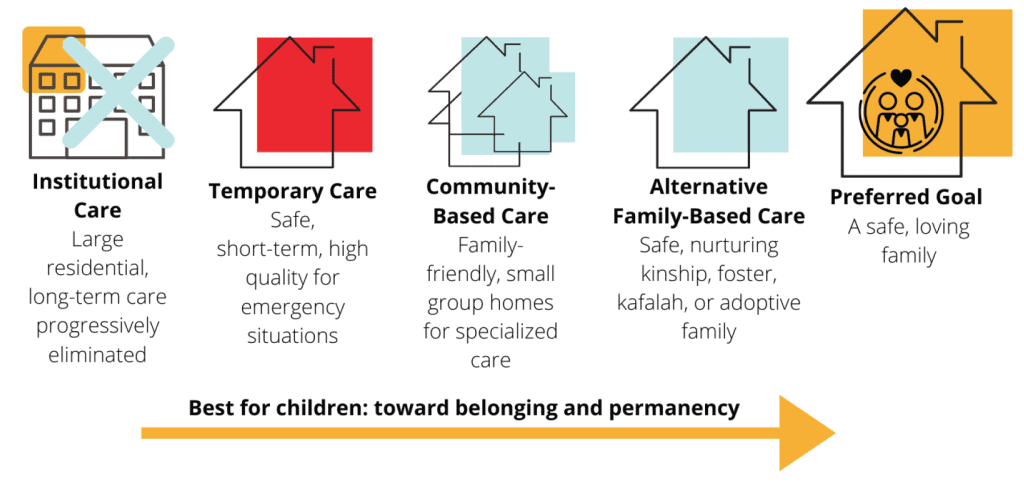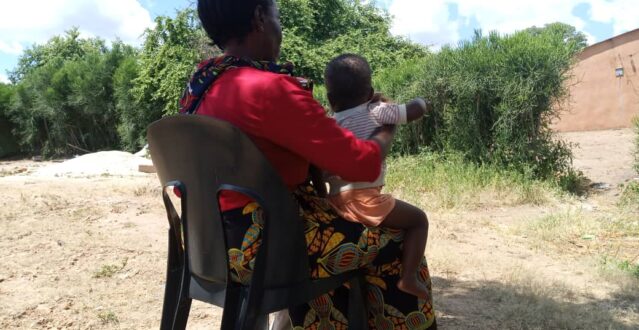Across the globe there is a trend in care: a move away from institutional care for children in favor of family- and community-based approaches. This trend is fueled by decades of research that clearly demonstrate the importance of family nurture for a child’s healthy development over the life span. Research also documents the undesirable effects of family separation and institutionalization upon children. Thus the best place for a child to grow up is in a safe, nurturing family.
Families provide more than physical care. They provide love, attention, and attachments upon which relationships are built over the course of a lifetime. If an alternative to family is needed, it should be family-like and community-based. Emergency care may be needed, but institutional care should always be a last resort.
A Continuum of Care for Children

Children need families. Family is the locus of love, care, encouragement, motivation, and support. Within a family, a child can receive individual attention: a held hand, an embrace. Through play, active listening, and mimicry, a child learns the basics of engagement and communication. Part and parcel of healthy family life, these simple actions have significant impacts. The quality of family life, especially parent-child bonds, affects a child’s holistic development and sets an early life trajectory.
Strong bonds—healthy attachments—between a child and parent are paramount. Early experiences play a major role in setting a course for life. Among the lengthiest longitudinal studies of human development, the British National Birth Cohort Study started following 14,000 babies in 1946; participants are now in their 70s. It has shown that parents are the most significant influence for a child’s cognitive development and a child’s educational and occupational outcomes. Other studies have demonstrated that children who have nurturing parents, who speak with them often and listen attentively, perform better and realize higher achievement. The connection between a caring adult and a child is so significant that any deprivation of such a connection can have negative consequences.
Of course, family life is not a panacea. Families sometimes struggle, and many face complex challenges. Not all families can provide the basics for their children. Not all families are safe places for children. Parental addiction, illness, or death can unravel the fabric of family life. A child with a disability can strain some families, especially if community support and resources are thin.
For some children, an alternative is needed, be it adoption, foster care, kinship care, or specialized care. Among alternatives for children, large residential facilities should always be a last resort, temporary at best, used only if other alternatives are not available. That is because long-term institutional care deprives a child of the individual nurture that is foundational for 17 healthy development, often separates a child from community and cultures, and increases other risk factors.
The younger the child, the greater the risks associated with institutional care. During a child’s early weeks, months, and years of life, the brain is still developing. This is a narrow window of time for cognitive, social, emotional, and language development, capacities which are built through sustained and frequent interactions with caring adults. Without sustained individual nurture, children in institutional care are at great risk for cognitive and physical delays.
While in institutional care, children are at higher risk of neglect and abuse. Significant numbers experience mental health issues, including trauma, isolation, and depression. In some cases, children have been trafficked out of orphanages for forced labor or sex. As adults, those who grew up in residential care are at higher risk for homeless, incarceration, and suicide, and they have more difficulty in forming healthy social relationships.
Summary: The Importance of Family
The social sciences are clear about the importance of a family for a child’s well-being and healthy development. A safe, nurturing family is the optimal place where a child connects with caring adults who are responsive to individual needs, nurture individual gifts, and address specific needs. Bonds with family, especially parents, make a child feel loved and secure. This environment helps a child to learn, be creative, problem solve—the basics for healthy development in years to come. Depriving a child of family nurture, especially a disruption of parental-child bonds, can have long-lasting negative implications.
Given the importance of a safe, nurturing family or family-like environment for a child, the trend toward family- and community-based care warrants support. If a family is in distress, take steps to strengthen the family to keep children with those who know and love them. If a child is separated from a family, look for a long-term solution that will provide the child with a sense of belonging, safety, and permanency. Of course, when safe to do so, reunite a child with his or her family.
A child is a precious gift. A safe, nurturing family provides the child with a sense of belonging and permanency critical to healthy development. It is not just food, clothing, and shelter. A child needs a hand to hold, a person to encourage and support him or her in realizing potential. This is a family’s role, place, and strength. Families do struggle at times, some mightily. Yet with support and inherent resilience, they are often resilient enough. It is best for a child to grow up in a safe, nurturing family.
This article is from the publication “A Family for Every Child.” Read the full publication here.



